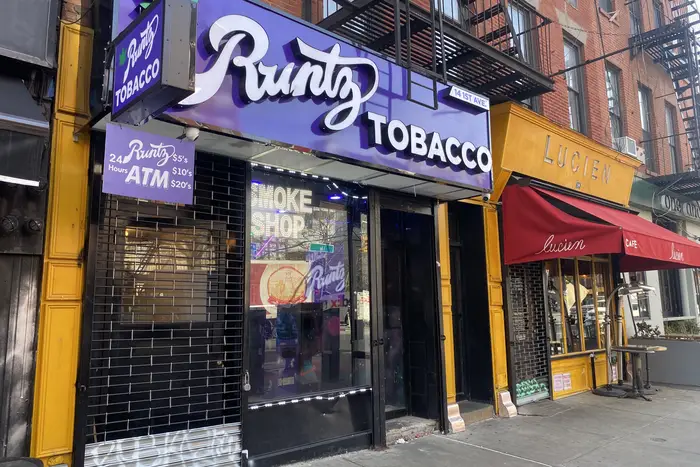Mayor Eric Adams is teaming with Manhattan District Attorney Alvin Bragg to crack down on illegal cannabis shops by using some new tactics.
The city is seeking to leverage a little-used provision of New York’s Real Property Actions and Proceedings Law to get building landlords to evict store owners who sell marijuana without a license.
If the landlords do not take action, the NYC Sheriff’s Office will have the authority to take over the eviction proceedings.
The city has also filed four public nuisance complaints against East Village establishments that it alleges are selling marijuana products without a license — including to minors. Adams, Bragg and law enforcement announced the effort at a press conference on the Upper West Side Tuesday.
“We won’t stop until every illegal smoke shop is rolled up and smoked out,” Adams said.
But that’s a big undertaking. Law enforcement officials discussed the nuisance abatement strategy at a City Council hearing on unlicensed cannabis shops last month. At the time, Sheriff Anthony Miranda made it clear to council members eager to eradicate the illegal pot shops that this tactic was unlikely to lead to stores being shut down right away.
“Nuisance abatement takes a little while because the person has to have due process,” Miranda said at that hearing.
The sheriff is leading the multi-agency taskforce Adams convened in December to address the recent explosion of stores selling marijuana without a license. The NYPD has counted more than 1,300 of these shops across the five boroughs.
The lawsuits, filed Tuesday by the city, targeted unlicensed cannabis shops located in lower Manhattan, the area where the state’s first two legal dispensaries recently opened their doors.
More small businesses are in the crosshairs: Bragg’s office has sent out 400 warning letters to the owners of buildings housing other smoke shops around Manhattan, urging them to voluntarily commence eviction proceedings.
Asked how he would prioritize which shops to pursue formal legal action against, Bragg said he would take a range of factors into consideration, including whether they heed initial warnings, whether they’re located near legal shops and whether they’re selling to minors.
Inside one of the shops named in the new lawsuits, employees continued slinging products on Tuesday morning, apparently unfazed by the city’s latest threat. Known as Broadway, the store sits one block south of the city’s first legal dispensary, which is operated by Housing Works.
An employee at Broadway said he frequently served customers who had attempted to buy cannabis from Housing Works, but they complained of long lines or a shortage of offerings.
Vickie Paladino via Twitter
“They send their customers here to buy lighters, papers, pens. They’re not fully prepared,” said the employee, who declined to give his name for fear of further angering the city law enforcement. “You cannot close 2,000 smoke shops for that one store.”
While the store had applied for a cannabis license nearly a year ago, the employee said they had largely given up hope of receiving official permission to operate because of the time passed. The state’s early batch of licenses are being reserved for people with past marijuana convictions or their family members.
“They play games with us,” he said. “Why not just give out the licenses and make money fast?”
Saint Marks Convenience has received a public nuisance complaint for allegedly selling marijuana without a license.
At the press conference, Chris Alexander, executive director of the state Office of Cannabis Management, acknowledged the need to distribute more retail licenses, but he said that operating an illegal shop now could affect an applicant’s ability to get one.
Another of the complaints names as defendants the owners of the property housing Saint Mark’s Convenience and Smoke Shop, as well as the proprietors of the shop itself. It states that on three separate occasions in December, an underage auxiliary police officer bought marijuana from the store. Each time, the officer went undercover in plainclothes, according to the complaint.
The lawsuit cites the city’s Nuisance Abatement Law and states all property related to the nuisance — that is, unlicensed pot sales — should be seized from the premises, and the landlords should be fined $1,000 for every day they allowed the nuisance to continue.
Adams said his administration would share information about the enforcement effort in Manhattan with district attorneys in other boroughs.
H/T: gothamist.com




